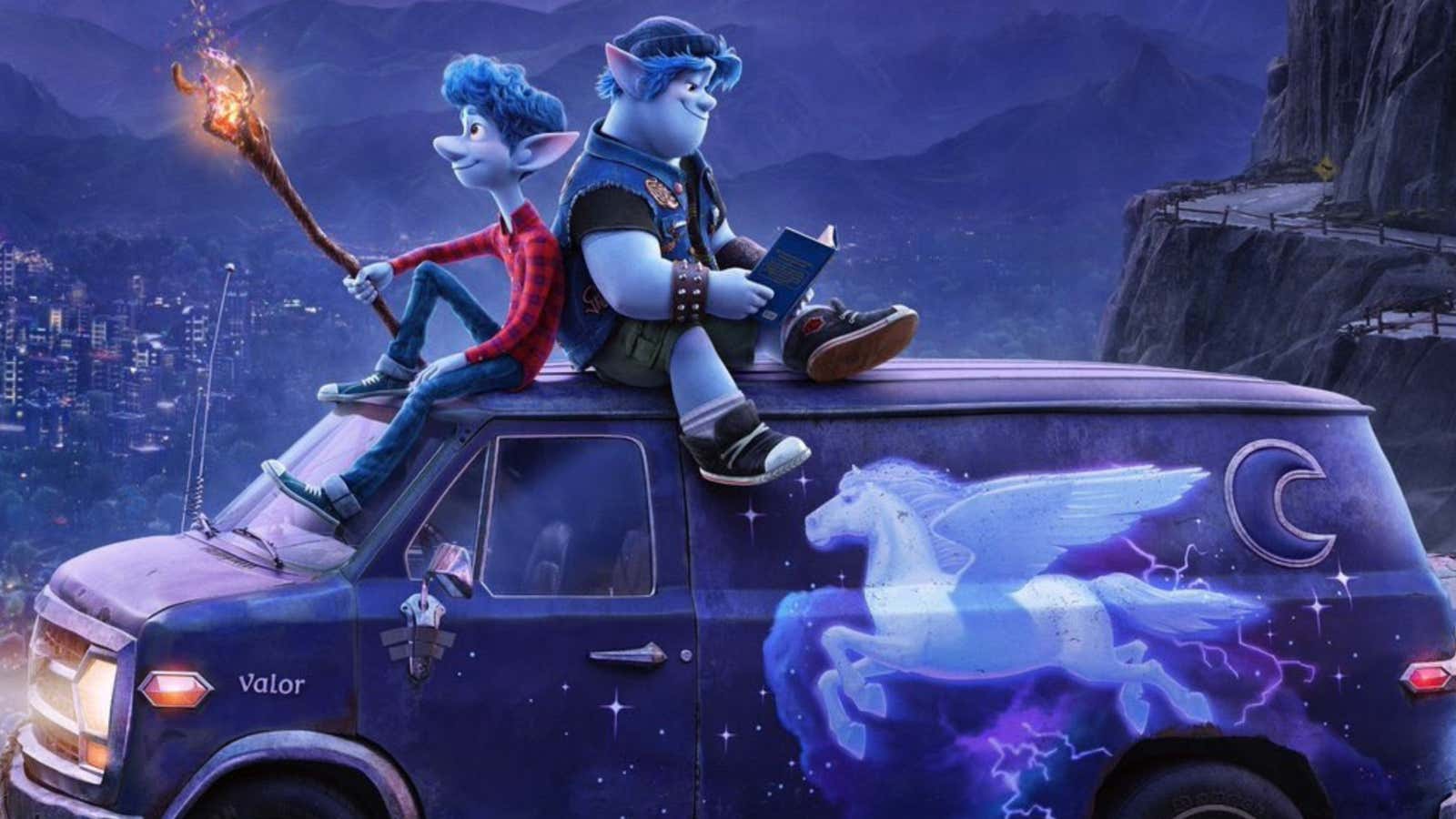Pixar’s next film, Onward, is about two teenage Elven brothers who reanimate their dead father—except it goes horribly wrong and he returns to the realm of the living as only a pair of legs, which forces the siblings to drive around their fantasy world with dad’s zombified limbs in the back of a van desperately trying to figure out how to conjure up the rest of his body before he’s lost forever.
So, yeah, it’s going to be pretty weird, even by the standards of the studio that brought us rats cooking in a fine French restaurant and monsters working in a factory that harvests children’s screams.
The weirdness is a deliberate strategy to help the Disney-owned production house reverse course on a string of underwhelming (by Pixar standards) sequels, and maintain its decades-long place atop the animation industry.
Pixar, now 24 years old (and 21 films in), has reached the point in its lifespan when it needs to start coming up with new ideas. After a series of uncharacteristically dull sequels this decade, critics began to wonder if the mighty animation studio might have lost a step. Toy Story 4 performed objectively well at the box office, but it still fell short of expectations, earning $120 million in its opening weekend, compared to the $140 Disney had projected. Cars 2 and 3, Monsters University, and Finding Dory represented Pixar at its creative low point.
That was reflected in overall box office performance. Adjusted for inflation, the box-office returns for Pixar films have stayed relatively flat (with one or two exceptions) over the last two decades. Six of the eight films to gross $300 million or less in the United States have come since 2011. Its three worst-performing films ever—again, adjusted for inflation—were all released within the last five years:
This year, Sony’s Spider-Man: Into the Spider-Verse won the Oscar for best animated film, the first time since 2011 that a Disney film did not win the award. Into the Spider-Verse, a stylish, risky, audacious effort, represented everything that recent Disney-Pixar films did not.
In some ways, Pixar has become a victim of its own success. Expectations, both critically and commercially, are so high for every film the studio puts out. It has become virtually impossible for any of these films to live up to the hype. (Disney’s Star Wars films are experiencing a similar phenomenon.)
It didn’t help that Pixar moved away from the one thing that separated the company when it first started—boldness and originality—and toward sequels of concepts that didn’t demand them. This started, perhaps not coincidentally, a few years after Disney bought Pixar for $7.4 billion in 2006. The Mouse House has made it clear that it is going to milk every piece of its intellectual property for all their worth. And, for awhile, that strategy appeared to extend to its newly purchased animation studio.
But now Pixar is, smartly, reversing course again, this time back toward what made it one of the most beloved entertainment companies in the world in the first place. As BuzzFeed film critic Alison Willmore pointed out in 2015, Pixar has always been a little strange, but it’s at its best when it’s truly leaning into that strangeness. “Pixar has been able to make children’s films based on concepts that, in abstract, seem insane—robots falling in love on the abandoned, garbage-filled wreck of planet Earth, or an elderly man setting off on a suicidal mission to finish plans that were never fulfilled during the decades-spanning montage summing up his marriage,” Willmore wrote.
The 2015 film Inside Out, Willmore argued then, was the best example of this: a bold concept, executed to perfection, that smuggled complex themes and ideas into the veneer of a kids’ movie. And, most importantly, it was original—a repudiation of the Hollywood sequel machine controlling the industry.
Pete Docter, the director of Inside Out, became the chief creative officer of Pixar last year after his predecessor, John Lasseter, left the company amid a sexual misconduct scandal. Not only is Docter reportedly committed to the long overdue process of making the studio more diverse (it recently hired only its second-ever female director, Domee Shi), but he has also issued a new mandate: No more sequels.
To that end, Docter himself will be directing the next Pixar film after Onward. Titled Soul, the film is about a middle school music teacher whose soul is separated from his body and “transported to the ‘You Seminar,’ a center in which souls develop and gain passions before being transported to a newborn child.” Weird, but necessary.
